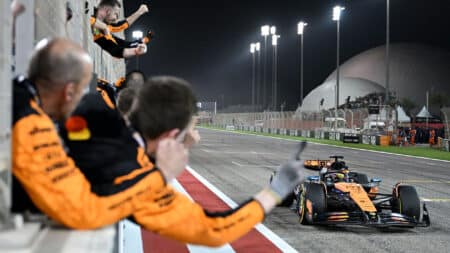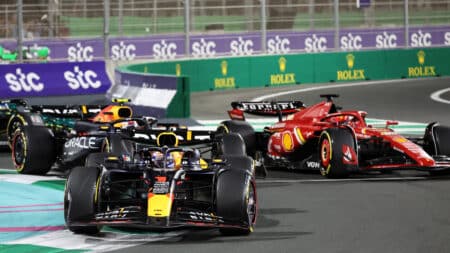
Alonso: Verstappen not a threat to my Aston Martin F1 seat
Fernando Alonso says it's "very unlikely" Max Verstappen will be his team-mate, and rejected the idea that he could be replaced by the Dutchman
Formula 1 fans have been lucky over the last few seasons – the championship has gone down to the last race more often than not with Alonso and Vettel fighting it out in Brazil in 2012, in Abu Dhabi in 2010 and then there’s 2008, one of the most exciting championship finales of all time.
The sport doesn’t usually give fans such edge-of-the-seat entertainment. Jim Clark and Lotus were nigh on unbeatable in 1963 and ’65 and McLaren won all bar one of the 16 races in 1988. The list of dominant cars and drivers is long and, while there have been plenty of exciting championship finales, they’re not the norm. Indeed, F1 needs occasional dominance as much as football needs the 0-0 draw to remind people just how exciting something like 2008 is.
However, it seems that a couple of dominant seasons by Sebastian Vettel (2011 and 2013) has meant that something must be done. In response to this the F1 Strategy Group and the Formula One Commission agreed in Paris on Monday that “Double drivers’ and constructors’ points will be awarded at the final race of the Formula One season in order to maximise focus on the Championship until the end of the campaign”.
Yes – you really did read that right. Abu Dhabi will be worth – in championship points – as much as Spa and Suzuka combined, it’ll be worth twice as much as Brazil, twice as much as Monaco.
In 2002 Michael Schumacher walked the championship and had it all wrapped up by the French Grand Prix on July 21. Not great news for TV viewing figures that. So, in response, the scoring system was changed for 2003 from 10, 6, 4, 3, 2, 1 to 10, 8, 6, 5, 4, 3, 2, 1… All this did was reward mediocrity and Kimi Räikkönen, who only won one race in 2003, finished just two points behind Schumacher, who had won six.
The current system, that gives 25 to the winner, 18 for second, 15 for third, 12 for fourth, 10 for fifth etc., does reward those that fight for the win or the podium. The only thing that could perhaps be changed is to award fastest laps and pole positions with some points, but really, the scoring system was just fine. It didn’t need altering.
More on Formula 1
F1 season review podcast with Gary Anderson
F1’s number conundrum
The end of an era in Formula 1
The double-points last race will also mean that it becomes a more enticing proposition to race organisers. Because of that the cost of hosting it will rocket. In other words, we’ve probably seen the last title decider in Brazil…
Other changes to emerge from the meeting in Paris on Monday included a cost cap, which will come into affect in January 2015, five-second penalties, a Pirelli tyre test (finally) and the fact that drivers will be able to choose any number between 2 and 99 for their F1 careers.
It’s not a bad idea in principal this (merchandise departments up and down the pitlane certainly think so), but what do we think the chances are of actually seeing the numbers on the cars? The teams will be faced with either a £40 million sponsorship deal or slightly larger race numbers to please fans. We all know which option will win the day.
Formula 1 is teetering on a precipice at the moment – Bernie Ecclestone is facing bribery charges with no succession plan in place, no track can host a Formula 1 race without losing vast amounts of money and teams are so cash strapped that the likes of Hülkenberg are still not in a top seat. While the budget cap could be good news if it’s implemented wisely, the new regulation on the final race is – excuse the pun – pointless. Formula 1 has never been more baffling than it is now.

Fernando Alonso says it's "very unlikely" Max Verstappen will be his team-mate, and rejected the idea that he could be replaced by the Dutchman

Former FIA second-in command Robert Reid has expanded on the reasons behind his exit, saying that he was excluded after raising concerns over "fundamental principles" such as transparency and accountability

There's several key differentiators that could help you win big in F1 Fantasy for this weekend's 2025 Saudi Arabian GP. Here are our predictions; tips on drivers to avoid; which chips to play and further analysis

Can Red Bull rebound from its poor Bahrain showing? And will it be Piastri or Norris leading McLaren's charge? Here's the five themes to watch for at the Saudi Arabian GP